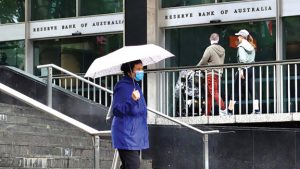Bloomberg
Australia’s central bank said it considered three options for the size of its first interest-rate increase since 2010, according to minutes of its May 3 policy meeting, when it raised the cash rate by 25 basis points.
The board agreed that hiking by 15 basis points, as forecast by most economists, didn’t make sense given policy was very stimulatory and it was highly probable further rate rises would be required, the Reserve Bank said.
It acknowledged an argument could be made for 40 basis points before opting for 25 basis points to signal a return to normal operating procedures following the pandemic, the minutes showed.
“Given that the board meets monthly, it would have the opportunity to review the setting of interest rates again within a relatively short period of time, based on additional information,†the central bank said.
The RBA’s decision to raise rates by a larger-than-expected 25 basis points to 0.35% saw it join global counterparts in the struggle against inflation. Governor Philip Lowe has signalled further hikes are in prospect after first-quarter inflation hit 5.1%, the fastest pace in more than 20 years.
Russia’s war on Ukraine and China’s virus lockdowns threaten to further fuel consumer-price pressures. That comes on top of a local economy that’s already recovering robustly, with low unemployment and strong consumer spending.
“Globally, it was not yet clear how the various supply-side problems will be resolved,†the RBA said in the minutes. “Domestically, there was uncertainty about how household spending would respond to the erosion of real wages, as wages have not kept the pace with consumer prices.â€
The data is predicted to show a slight acceleration in annual wages growth to 2.5%, about half the rise in consumer prices. The RBA has said liaison with businesses indicates material gains in labor costs are expected in the period ahead. Jobs data on Thursday is forecast to show the unemployment rate dropped below 4% in April for the first time in decades.
The RBA’s tightening presents a problem for Prime Minister Scott Morrison’s government ahead of an election this Saturday as the electorate is heavily indebted and already grappling with rising cost of living pressures.
“Members observed that it would be more difficult to return inflation to the target if the inflation psychology in Australia were to shift in an enduring way,†the minutes showed, referring to the 2-3% target.
“They also agreed that further increases in interest rates would likely be required to ensure that inflation in Australia returns to the target over time.â€
 The Gulf Time Newspaper One of the finest business newspapers in the UAE brought to you by our professional writers and editors.
The Gulf Time Newspaper One of the finest business newspapers in the UAE brought to you by our professional writers and editors.
